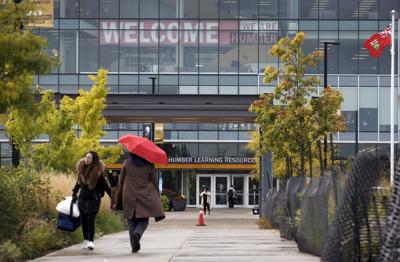Half of Humber Polytechnic’s board of governors, including the chair and vice-chair, have resigned en masse over a dispute with the president of the college, the Star has learned.Ìý
A spokesperson for the pc28¹ÙÍøcollege confirmed late Friday that eight members of the board quit earlier that day but would not provide further details, including names of the people who tendered their resignations or the reason for the departures.Ìý
A source with inside knowledge told the Star that members had been trying to “elevate governance practices,” but had allegedly been met with resistance from Humber president Ann Marie Vaughan. The source alleged the president would not allow the board to employ governance tools such as meeting in camera and allegedly wouldn’t let members speak to each other without her being present.Ìý
”(Members) felt they couldn’t do their job,” said the source who was unable to speak officially. “Nobody can function like this.”
Humber spokesperson Andrew Leopold told the Star that “we cannot comment on the specifics of board activities or discussions,” noting that board directors are bound by confidentiality requirements.
However, he added, “in alignment with best practices for strong governance principles, in-camera sessions are an option available to the board within the parameters as outlined in existing board policies and legislation directing the actions of public boards, however informal meetings that would address board business are discouraged in events where the full board is not present.”
And he said, “Humber Polytechnic’s leadership remains strong, and we continue to operate with our dedicated team to provide exceptional education to our students.”Â
Chair Akela Peoples and member Pauline Larsen confirmed to the Star that they are among the eight who quit, but referred all other queries to legal counsel.Ìý
The other six who resigned are vice-chair Anne Trafford, John Breakey, Ali Ghiassi, Earl Davis, Lekan Olawoye and Joseph Carnevale. All are from outside Humber and three — Breakey, Larsen and Davis — were government appointees (the rest of the board is elected).Ìý
The board members who remain are Jacqueline Edwards, Rudy Dahdal and Richard Rabba, all of whom just joined the board this past fall; four members from the Humber community — Kristy Adams, Ana Downes, Akanni Fredrick and Lisa Salem-Wiseman — and president Vaughan.Ìý
Humber spokesperson Leopold said, Vaughan “has the utmost respect for those who have and continue to serve on our Board of Governors and will continue working closely with the Board to provide our students with the educational experience they need to meet the challenges of the future.”Â
and manages Humber’s activities and fiduciary affairs, including approving the business plan as well as tuition and ancillary fees for programs. The board also oversees government policy and assesses the performance of the president.
Humber’s board normally consists of 17 members: 12 external positions, 4 internal ones and the president.Ìý. She is the first woman to hold the position at Humber. Previously she was president and CEO of Loyalist College.
°Õ³ó±ðÌý, indicates there was a full board meeting earlier this week, on Jan. 15, and an executive and governance committee meeting on Jan. 16.Ìý
“Humber Polytechnic would like to thank the members for their dedication and service towards meeting the ultimate goal of equipping students with the skills and knowledge for employability and to succeed in an evolving workforce,” Leopold said.
“While it is early in the process, Humber is moving forward to identify strong candidates and fill the open board positions that will lead to continued success for the institution and its community.”
Governors are unpaid and can hold office for a term not to exceed three years (and not more than six years consecutively).Ìý
Humber, Â and has three campuses in the city, has .Ìý





















To join the conversation set a first and last name in your user profile.
Sign in or register for free to join the Conversation